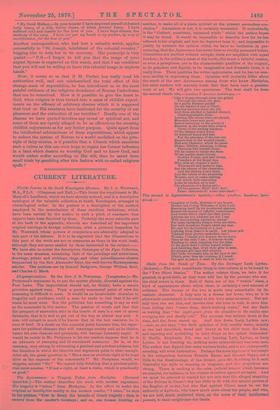Shells from the Sands of Time. By the Dowager Lady
Lytton, (Biokers).—The most remarkable thing in this volume is to be found in the "Two Ghost Stories." The author relates them, we take it for granted, in good-faith, as they were told her by the persons who wer the chief actors in them. Both of them are of the " wraith " class, a kind of appearances about which there is certainly a vast amount of evidence. The former of the two is made very remarkable by its realistic character. A lady sees in a dream her lover, who, as it 'is afterwards ascertained, is drowned at the very same moment. But not only does she see him, and fancies that she tries in vain to save him from falling into "some deep, black-looking water," but she finds on waking that "her night-gown from the shoulders to the ankles was wringing wet and deadly cold." The account was written down at the time, and the dress stored up. And this dress Lady Lytton saw, —saw, as she says, "the dark splashes of foul, muddy water, exactly as she had described, broad and heavy at the skirt near the hem, and tapering and sprinkling in miry drops as the splash descended.' If Madlle. Ste'phanie d'A. was not hoaxing Lady Lytton, or Lady Lytton is not hoaxing us, nothing more extraordinary was ever seen. The author has dipped into some curious books, and is not nnfrequently amusing, and even instructive. Perhaps the most vigorous of her essays is the comparison between Francis Bacon and Samuel Pepys, not a little to the disadvantage of the former, pace Mr. Spedding be it said. Generally her style is wanting in elegance, and her prejudices are strong. There is nothing of the calm, judicial temper which becomes an essayist, for instance, in her violent invective against servants. And we must be allowed to remind her not only that tho alleged stupidity of the Britons in Cicero's day has little to do with the mental powers of the English of to-day, but also that against Cicero must be set the authority of Agricola, who knew much more about the people, and who, we are told, much preferred them, on the score of their intellectual powers, to their neighbours the Gauls.






































 Previous page
Previous page